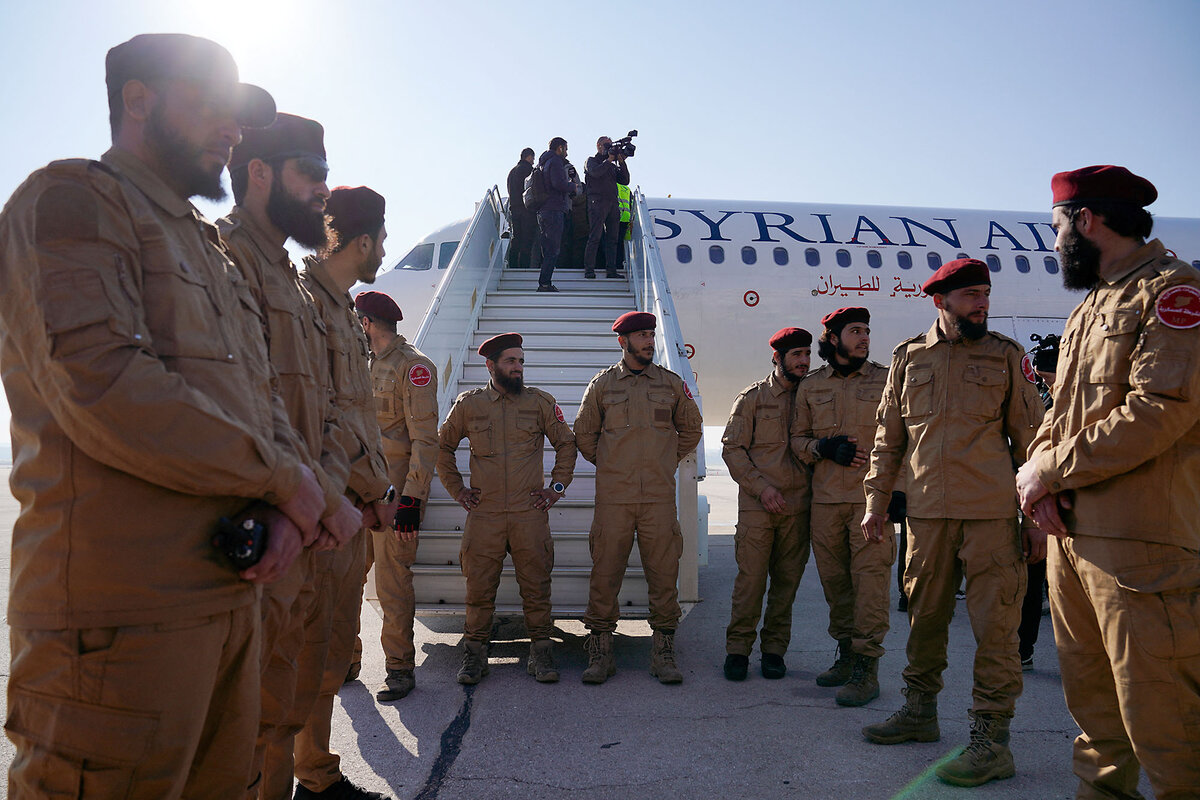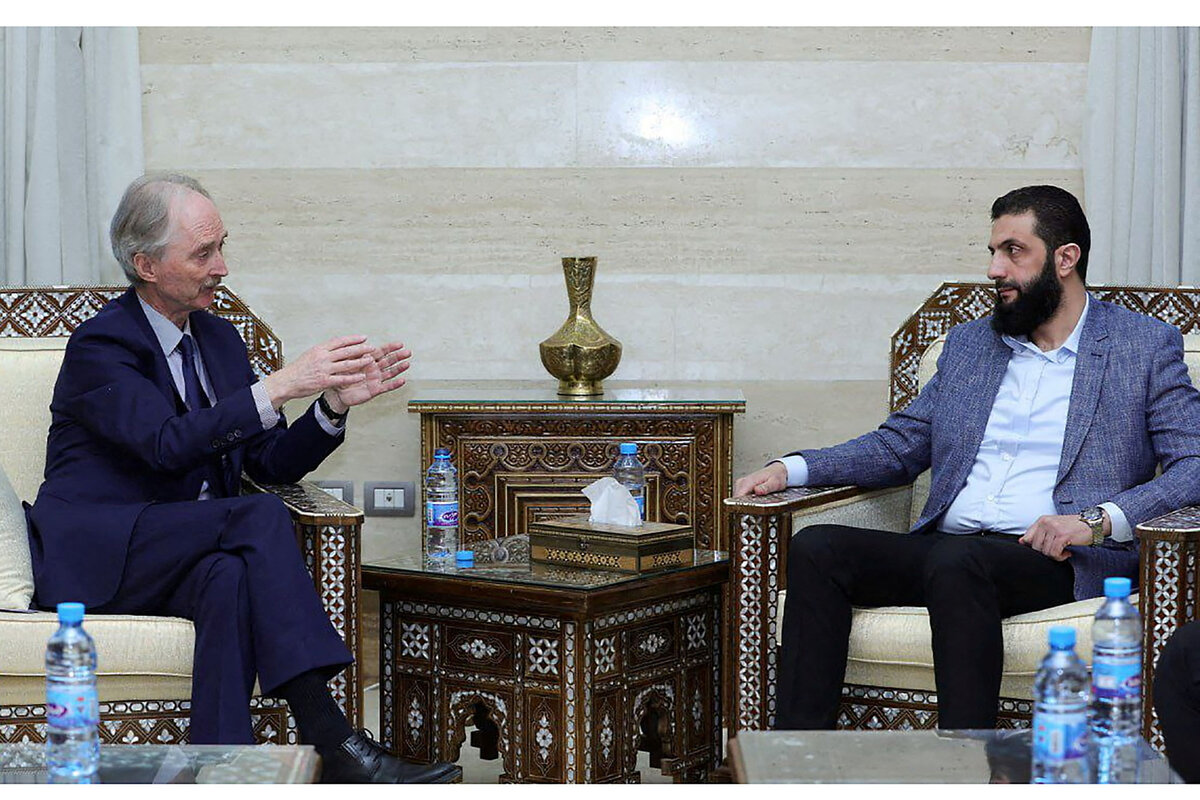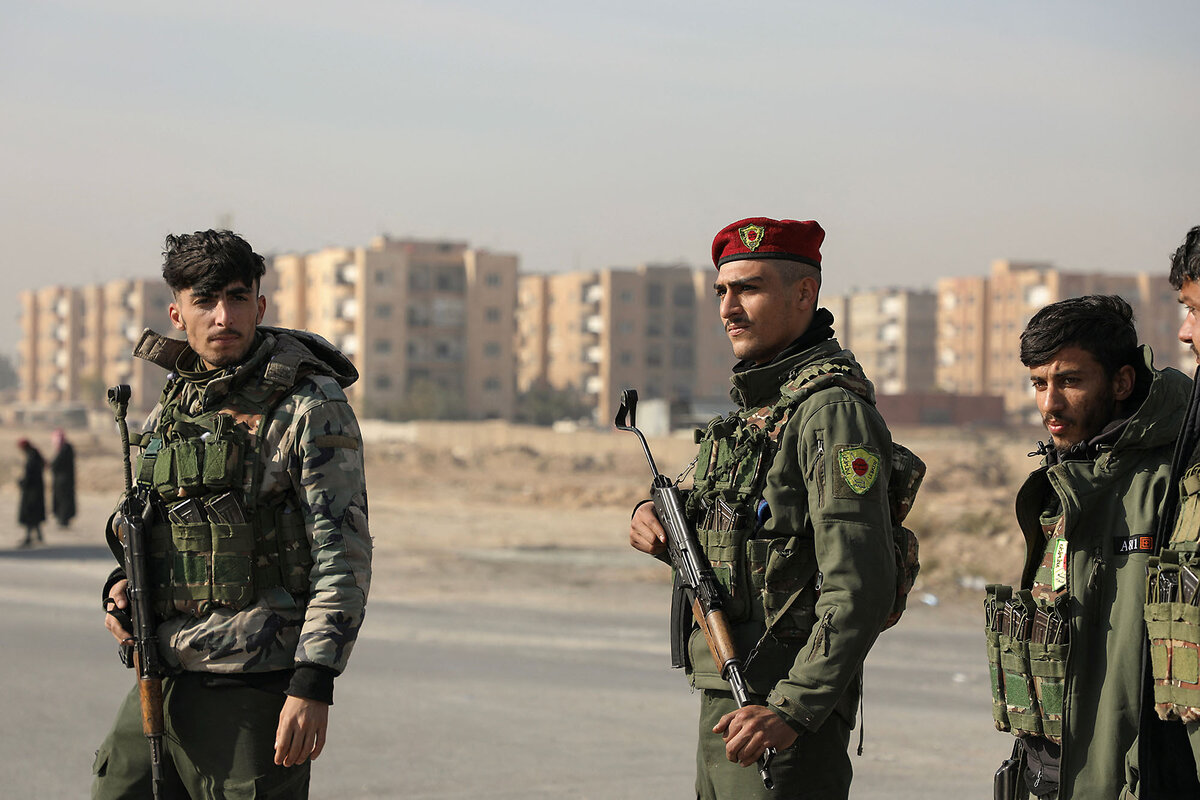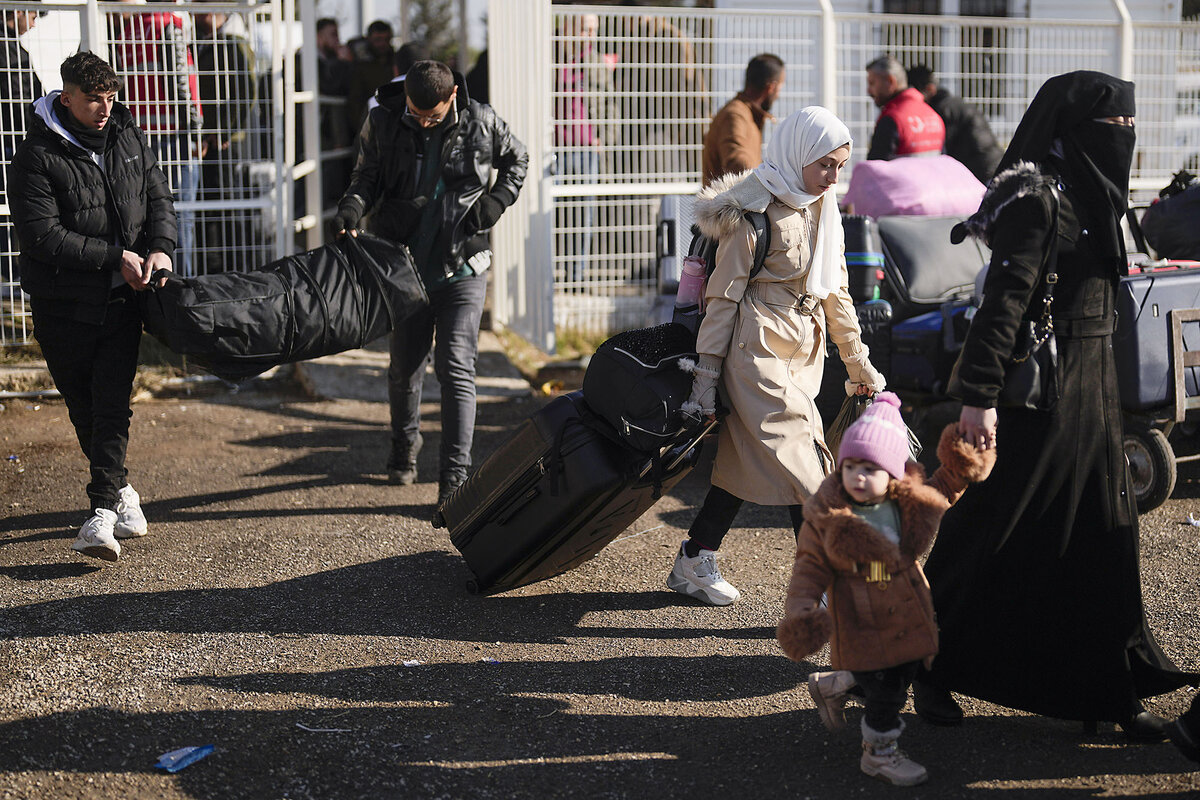With Iran on the decline, a new axis rises in Mideast. Syria is still key.
Loading...
| Doha, Qatar; and Amman, Jordan
The Syrian people’s toppling of the Assad regime is creating a new axis of power in the Middle East.
After years in which Turkey and Qatar backed what had been written off as the losing side in Syria’s civil war, the two nations are now geopolitical winners, filling the void left by the collapse of Iranian influence in the pivotal country.
Their sudden emergence as brokers and kingmakers in Syria raises the prospect of a realignment of the Arab Middle East.
Why We Wrote This
A story focused onFor years Turkey and Qatar backed what had been written off as the losing side in Syria’s civil war. With the Assad regime’s fall, and as Iran’s influence wanes, they are geopolitical winners. The Mideast’s axis of power is shifting, but it still runs through Syria.
Turkey and Qatar have their own specific and ambitious interests to pursue in Syria, analysts say. At the same time, both see an opportunity to use Syria to revive a common regional agenda: support for popular democratic movements and Islamist political parties.
Since the fall of Bashar al-Assad, Turkey and Qatar have been the most active foreign governments in Syria: Turkish intelligence chief İbrahim Kalın was in Damascus Friday; a Qatari government delegation visited the capital Sunday and reopened its embassy Tuesday.
At a gathering in Doha last week with the foreign ministers of Iran and Russia, the main outside backers of the crumbled Assad regime, the Turkish and Qatari foreign ministers worked behind the scenes to ensure a bloodless transition of power.
In Doha and later in a meeting in Aqaba, Jordan, it was Turkey and Qatar that Arab states, the United States, the European Union, and the United Nations relied on to reach out to the interim Syrian government.
They were well positioned. Only weeks before, as Arab states were moving to normalize ties with Syria and calls were growing in Washington to lift sanctions on the Assad regime, Turkey and Qatar were the last two countries supporting the Syrian opposition.
Qatar was the only nation that recognized the opposition as the legitimate Syrian government. The opposition ran an embassy in Doha.
Turkey, which allowed members of the Syrian opposition to operate in exile on Turkish soil, for years maintained contacts with the Islamist Hayat Tahrir al-Sham (HTS), the dominant rebel group that led the advance on Damascus, due to its military presence in northern Syria.
Strategic gains
Although Turkey denies planning the operation that overthrew Mr. Assad, once it was underway Ankara worked intensely with HTS and other rebel forces, including the Turkey-backed Syrian National Army, “to ensure it was conducted in the most bloodless, problem-free, and cost-effective way possible,” according to Turkish Foreign Minister Hakan Fidan.
“Clearly [Turkish President Recep Tayyip] Erdoğan is a winner in the geopolitical sense because until the very end, Turkey continued to sponsor the Syrian opposition. He gambled,” says Batu Coşkun, a Turkey analyst and nonresident fellow at the United Arab Emirates-based Trends Research and Advisory.
Opening Turkey up to millions of Syrian refugees had begun to hurt Mr. Erdoğan’s party at the polls. “Now there is an expectation Syrian refugees will return and Turkish influence will increase,” Mr. Coşkun says, “politically, militarily, and economically.”
Qatar, meanwhile, which was isolated and boycotted by its Gulf Arab neighbors only six years ago, is now a key mediator for the interim Syrian government while also facilitating Israel-Hamas ceasefire talks.
With Mr. Assad’s ouster, Qatar is set to “elevate its status on both regional and international stages, reinforcing its image as a peacemaker and a proactive player in Middle Eastern politics,” Ali Bakir, assistant professor at Qatar University, writes in an email interview.
“Qatar is poised to play a crucial role in Syria’s political, diplomatic, and economic future,” says Dr. Bakir, who is also a senior nonresident fellow at the Atlantic Council’s Scowcroft Middle East Security Initiative. “This involvement not only enhances Qatar’s influence within Syria but also solidifies its reputation as a stabilizing force in the region.”
National, regional goals
Turkey and Qatar are expected to use their new leverage in Syria to pursue a constellation of national and regional goals.
Observers say Ankara’s immediate goal is to weaken Kurdish elements in Syria, including the Kurdish Syrian Democratic Forces (SDF), an American ally that it views as a hostile terrorist movement.
Already, a U.S.-mediated truce between the Turkey-backed Syrian National Army and Kurdish forces collapsed Monday. On Tuesday Turkey was reported to be mobilizing military units at the Syrian border, raising fears of an imminent mass offensive against the SDF.
Analysts say Turkey is looking to exclude the SDF from any postwar political system and cultivate Ankara-friendly Kurdish groups to govern any future local Kurdish regions in Syria.
Key to these efforts: legalizing the military bases Turkey has established in northern Syria in recent years.
According to diplomatic sources, Turkey is negotiating lease agreements for its bases with HTS and the interim government – similar to the deals the Assad regime gave to the Russians – to avoid being declared a foreign occupying power by future Syrian governments.
Ankara’s goal is to replicate the arrangement it has in Somalia, where it holds exclusive rights to military bases and a naval presence in Somalia’s territorial waters, observers say.
Turkey had tried to establish similar military footprints in Libya and Tunisia after the Arab Spring, but failed.
“Now with Syria possibly emerging with a government friendly to Turkey, these ambitions can be realized,” says Mr. Coşkun.
Qatar, in turn, is looking to cement regional stability, prevent internal conflicts, and accelerate reconstruction in Syria.
Both Turkey and Qatar are eyeing an outsize role in Syria’s economy.
Observers and insiders say Doha and Ankara are seeking to expand their recent building of housing for thousands of displaced Syrians into larger-scale reconstruction, with Qatar providing financing and Turkey providing contractors and materials.
And both nations are expected to reactivate another agenda that unites them: the support for democratic movements and Islamists.
In the years following the 2011 Arab Spring, Ankara and Doha backed popular protests and Islamist parties. Their efforts ignited blowback from other Gulf monarchies, who doubled down on their support for counterrevolutionary authoritarians, eventually reversing the Arab Spring’s democratic gains.
This time, analysts and insiders say, Turkey and Qatar, wary of reigniting proxy conflicts in Syria, will not seek to export calls for democracy to other Arab states. Instead they will try to shore up Syria’s democratic transition to hold it up as a regional model – to lead by example.
“Syria is a new experiment to support popular mobilization,” says Mr. Coşkun. “With a more popular movement taking charge in Syria, it is an opportunity to show this is a feasible option.”
Leading by consensus?
Already Turkey and Qatar have avoided Iran’s pitfall in Syria; instead of edging other powers out, they are inviting them in and pledging cooperation to ensure Syria’s success.
To allay concerns, they are reaching out and involving regional actors such as Saudi Arabia, the UAE, Egypt, and Jordan in multiple discussions about post-Assad Syria.
In turn, these Arab nations have signaled they are comfortable with Turkey and Qatar’s influence in Damascus.
“Turkey and Qatar have been inclusive and have taken into account Arab states’ concerns,” such as counterterrorism, avoiding a sectarian Syrian government, and dismantling drug smuggling rings, says one senior Arab diplomat close to the talks. “If this is the way forward, it is positive for us – and it is the complete opposite of the obstinate approach by the Syrian regime and Iran.”
Turkey has attempted to address concerns of Turkish dominance in Syria.
“We do not want Iranian domination in the region, nor do we want Turkish or Arab domination,” Mr. Fidan, the foreign minister, said in an interview with Saudi network Al Hadath Sunday, adding that Turkey, Saudi Arabia, and other Arab states can come together “to solve critical problems in the region.”
“Our message is clear. The idea of domination and imperialistic ambitions must be set aside. Attempting to control other countries in the region through proxy actions or providing financial support for ulterior motives ... leads to a vicious cycle.”










